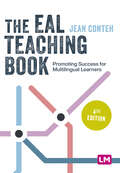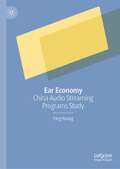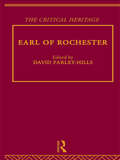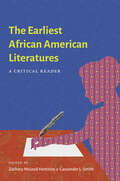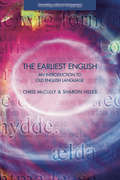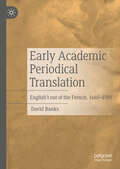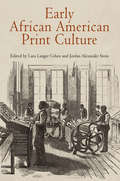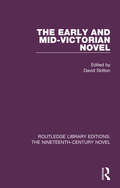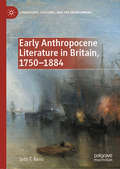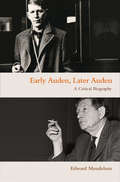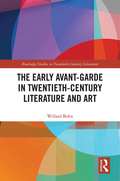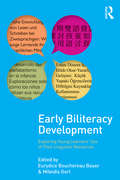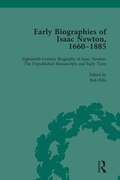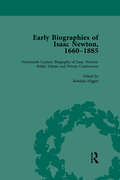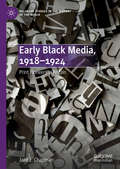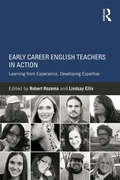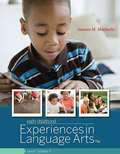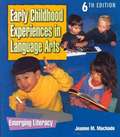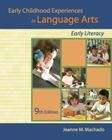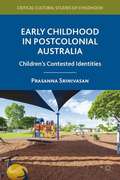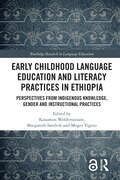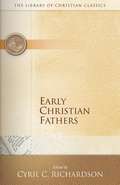- Table View
- List View
The EAL Teaching Book: Promoting Success for Multilingual Learners (Primary Teaching Now)
by Jean ContehAs the number of children for whom English is an Additional Language in schools increases, how do teachers and trainees prepare to support them to succeed? A complete guide to understanding, learning from and teaching bilingual and EAL children in schools. The text begins by asking ′who are EAL learners′ and challenges some of the misconceptions about this group. It goes on to examine language in depth, providing focused theory to help teachers and trainees better understand the wider context of children′s needs. This theory is supported by a wealth of information on practical teaching strategies and resources in the promoting learning section. The text covers planning across the curriculum for EAL and offers day-to-day practical support for teachers. The fourth edition is updated throughout and includes a new chapter on EAL and SEND.
The EAL Teaching Book: Promoting Success for Multilingual Learners (Primary Teaching Now)
by Jean ContehAs the number of children for whom English is an Additional Language in schools increases, how do teachers and trainees prepare to support them to succeed? A complete guide to understanding, learning from and teaching bilingual and EAL children in schools. The text begins by asking ′who are EAL learners′ and challenges some of the misconceptions about this group. It goes on to examine language in depth, providing focused theory to help teachers and trainees better understand the wider context of children′s needs. This theory is supported by a wealth of information on practical teaching strategies and resources in the promoting learning section. The text covers planning across the curriculum for EAL and offers day-to-day practical support for teachers. The fourth edition is updated throughout and includes a new chapter on EAL and SEND.
Ear Economy: China Audio Streaming Programs Study
by Ying HuangThis book sheds light on the overall description and explanation of the current socio-political, economic and cultural environment concerning the development of China's audio streaming programs industry. It interprets the emergence of the “ear economy” through the subjects of media ecology, media psychology, communication studies and cultural criticism, media industrial studies, sociology and anthropology. The book skillfully weaves together historical, cultural, and industry studies, along with textual and critical discourse analysis. This interdisciplinary work contributes to multiple academic fields including literary and cultural studies, media and communication studies, China/Asia studies, and political theory.
Earl of Rochester: The Critical Heritage (Critical Heritage Ser.)
by David Farley-HillsFirst published in 2002. Routledge is an imprint of Taylor & Francis, an informa company.
The Earliest African American Literatures: A Critical Reader
by Zachary McLeod Hutchins, Cassander L. SmithWith the publication of the 1619 Project by The New York Times in 2019, a growing number of Americans have become aware that Africans arrived in North America before the Pilgrims. Yet the stories of these Africans and their first descendants remain ephemeral and inaccessible for both the general public and educators. This groundbreaking collection of thirty-eight biographical and autobiographical texts chronicles the lives of literary black Africans in British colonial America from 1643 to 1760 and offers new strategies for identifying and interpreting the presence of black Africans in this early period. Brief introductions preceding each text provide historical context and genre-specific interpretive prompts to foreground their significance. Included here are transcriptions from manuscript sources and colonial newspapers as well as forgotten texts. The Earliest African American Literatures will change the way that students and scholars conceive of early American literature and the role of black Africans in the formation of that literature.
The Earliest English: An Introduction to Old English Language (Learning about Language)
by Chris Mccully Sharon HillesThe Earliest English provides a student-friendly introduction to Old English and the earliest periods of the history of the English Language as it evolved before 1215. Using non-technical language, the book covers basic terminology, the linguistic and cultural backgrounds to the emergence and development of OE, and the OE vocabulary that students studying this phase of the English language need to know. In eight carefully structured units, the authors show how the vocabulary of Old English contains many items familiar to us today; how its characteristic poetic form is based on a beautiful and intricate simplicity; how its patterns of word building and inflectional structure are paralleled in several present day languages and how and why the English language and its literature continued to change so that by the mid-12th century the English language looks more like the 'English' that we are familiar with in the 21st century. Features of the book include: the provision of accessible guides to some important 'problem topics' of classical OE stimulating cross-linguistic comparisons, e.g. the pronoun system of OE as compared with the pronoun system of present day Dutch cleverly laid out translation exercises, with structural help in the form of selective glossaries careful division into eight units, designed for both classroom use and self-study Written in a clear and accessible manner, The Earliest English provides a comprehensive introduction to the evolution of Old English language and literature, and will be an invaluable textbook for students of English Language and Linguistics.
Early Academic Periodical Translation: English't out of the French, 1665-1700
by David BanksThis book looks at the translations which appeared in the Philosophical Transactions and whose source texts had appeared in the Journal des Sçavans during the period 1665 to 1700. The theoretical background of the study is Systemic Functional Linguistics. The book provides linguistic analyses of both translations and source texts, considering in particular process types, the nature of themes, modality and nominalization of processes. The periods looked at are defined in terms of the editors of the respective journals. Differences in the linguistic features of the translations and source texts are explained in terms of the historical context. Since these were the first two academic periodicals, the texts studied here were the first attempts at translating academic articles, and thus have particular significance.
Early African American Print Culture
by Jordan Alexander Stein Lara Langer CohenThe eighteenth and nineteenth centuries saw both the consolidation of American print culture and the establishment of an African American literary tradition, yet the two are too rarely considered in tandem. In this landmark volume, a stellar group of established and emerging scholars ranges over periods, locations, and media to explore African Americans' diverse contributions to early American print culture, both on the page and off.The book's seventeen chapters consider domestic novels and gallows narratives, Francophone poetry and engravings of Liberia, transatlantic lyrics and San Francisco newspapers. Together, they consider how close attention to the archive can expand the study of African American literature well beyond matters of authorship to include issues of editing, illustration, circulation, and reading--and how this expansion can enrich and transform the study of print culture more generally.Published in cooperation with the Library Company of Philadelphia.
Early American Civilizations: Activity Book (Amplify Core Knowledge Language Arts, Grade 5 #Unit 2)
by Amplify EducationNIMAC-sourced textbook
Early American Civilizations: Reader (Amplify Core Knowledge Language Arts, Grade 5 #Unit 2)
by Amplify EducationNIMAC-sourced textbook
The Early and Mid-Victorian Novel (Routledge Library Editions: The Nineteenth-Century Novel #35)
by David SkiltonThe Victorian period was the age of the novel and critics at the time clearly saw the importance of prose fiction. First published in 1993, this anthology contains over fifty original extracts from contemporary critics on the early and mid-Victorian novel. Arranged thematically, the volume covers such topics as literary form, the social responsibility of literature, issues of politics and gender, the influence of criticism, realism, plot and characterisation, imagination and creativity, and the office and social standing of the novelist. The introductions and notes draw together the large number of voices and guide the reader through the Victorian literary critical debate. This accessible and invaluable guide will be of interest to those studying Victorian literature.
Early Anthropocene Literature in Britain, 1750–1884 (Literatures, Cultures, and the Environment)
by Seth T. RenoThis book questions when exactly the Anthropocene began, uncovering an “early Anthropocene” in the literature, art, and science of eighteenth- and nineteenth-century Britain. In chapters organized around the classical elements of Earth, Fire, Water, and Air, Seth Reno shows how literary writers of the Industrial Era borrowed from scientists to capture the changes they witnessed to weather, climate, and other systems. Poets linked the hellish flames of industrial furnaces to the magnificent, geophysical force of volcanic explosions. Novelists and painters depicted cloud formations and polluted urban atmospheres as part of the emerging discipline of climate science. In so doing, the subjects of Reno’s study—some famous, some more obscure—gave form to a growing sense of humans as geophysical agents, capable of reshaping Earth itself. Situated at the interaction of literary studies, environmental studies, and science studies, Early Anthropocene Literature in Britain tells the story of how writers heralded, and wrestled with, Britain’s role in sparking the now-familiar “epoch of humans.”
Early Auden, Later Auden: A Critical Biography
by Edward MendelsonPresented in one volume for the very first time, and updated with new archival discoveries, Early Auden, Later Auden reintroduces Edward Mendelson's acclaimed, two-part biography of W. H. Auden (1907–73), one of the greatest literary figures of the twentieth century. This book offers a detailed history and interpretation of Auden’s oeuvre, spanning the duration of his career from juvenilia to his final works in poetry as well as theatre, film, radio, opera, essays, and lectures. Early Auden, Later Auden follows the evolution of the poet’s thought, offering a comparison of Auden’s views at various junctures over a lifetime. With penetrating insight, Mendelson examines Auden’s early ideas, methods, and personal transitions as reflected in poems, manuscripts, and private papers. The book then links changes in Auden’s intellectual, emotional, and religious experience with his shifting public role—showing the depth of his personal struggles with self and with fame, and the means by which these internal conflicts were reflected in his art in later years. Featuring a new preface by the author, Early Auden, Later Auden is an engaging and timeless work that demonstrates Auden’s remarkable range and complexity, paying homage to his enduring legacy.
The Early Avant-Garde in Twentieth-Century Literature and Art (Routledge Studies in Twentieth-Century Literature)
by Willard BohnThis book focuses on avant-garde literature and art in Europe and America during the first quarter of the twentieth century. It examines five movements that shaped our response to the demands of the modern age and contributed to the creation of a modern sensibility: Cubism, Futurism, the Metaphysical School, Dada, and Surrealism. Each of these arose in response to recent scientific, technological, and/or philosophical developments that drastically affected modern civilization. In turn, each was responsible for a major paradigm shift that altered the way in which we view—and respond to--the world around us. The final chapter is comparative in nature and studies the role of the mannequin in literature and art during the same period.
Early Biliteracy Development: Exploring Young Learners' Use of Their Linguistic Resources
by Eurydice Bouchereau Bauer Mileidis GortA large and growing number of students from culturally and linguistically diverse backgrounds in the US and around the world have the potential to develop bilingualism and biliteracy if supported in their immediate environment. At the forefront in focusing exclusively on biliteracy development in early childhood across a variety of languages, this book provides both findings from empirical research with young bilinguals in home and school contexts and practical applications of these findings. Each chapter is structured in a similar format to offer parallel descriptions of the research, including a brief review of related empirical studies, an overview of the methods for data collection and analysis, a description of the main findings, and specific pedagogical implications to support educators’ efforts to construct meaningful, challenging, and dynamic literacy and language learning communities where one or more languages are used for communicating and learning. Pushing the field forward, this book is a valuable resource for helping literacy educators understand and respond to critical issues related to the development of young children’s literate competencies in two languages in home and school contexts.
Early Biographies of Isaac Newton, 1660-1885 vol 1
by Rebekah Higgitt Rob Iliffe Milo KeynesA collection of the many biographies of scientist Isaac Newton, demonstrating the ways in which his reputation continued to develop in the centuries after his death. It includes private letters, poetry and memoranda, and explores the debate over Newton's reputation, work and personal life.
Early Biographies of Isaac Newton, 1660-1885 vol 2
by Rebekah Higgitt Rob Iliffe Milo KeynesA collection of the many biographies of scientist Isaac Newton, demonstrating the ways in which his reputation continued to develop in the centuries after his death. It includes private letters, poetry and memoranda, and explores the debate over Newton's reputation, work and personal life.
Early Black Media, 1918–1924: Print Pioneers in Britain (Palgrave Studies in the History of the Media)
by Jane L. ChapmanThis book represents the first systematic attempt to analyse media and public communications published in Britain by people of African and Afro-Caribbean origin during the aftermaths of war, presenting an in-depth study of print publications for the period 1919-1924. This was a period of post-conflict readjustment that experienced a transnational surge in special interest newspapers and periodicals, including visual discourse. This study provides evidence that the aftermath of war needs to be given more attention as a distinctly defined period of post-conflict adjustment in which individual voices should be highlighted. As such it forms part of a continuing imperative to re-discover and recuperate black history, adding to the body of research on the aftermaths of The First World War, black studies, and the origins of diaspora.Jane L. Chapman analyses how the newspapers of black communities act as a record of conflict memory, and specifically how physical and political oppression was understood by members of the African Caribbean community. Pioneering black activist journalism demonstrates opinions on either empowerment or disempowerment, visibility, self-esteem, and economic struggles for survival.
Early Career English Teachers in Action: Learning from Experience, Developing Expertise
by Robert Rozema Lindsay EllisThe first few years of teaching are critical to the professional development of effective English teachers. In these crucial years, new teachers establish their identities, learn the ins and outs of the curriculum, acclimate to unfamiliar communities, and cope with student behaviors that they never expected. All of this can be daunting for novice teachers. This book can help. The stories within are written by English teachers in the early stages of their careers. In their carefully crafted narratives, teachers offer practical strategies, professional insights, and a wealth of tips for surviving the first years in the classroom. The narratives are grouped into thematic chapters with brief introductions of key terms, helpful learning activities, and provocative discussion questions, all intended to foster critical conversation about beginning a career teaching English. In a time when many teachers leave the profession too soon, Early Career English Teachers in Action gives voice to those who have decided to stay. More importantly, this book validates teacher narratives as a powerful way of understanding what happens inside of the classroom—a way that provides more authentic evidence of learning than standardized test scores will ever supply.
Early Childhood Experiences In Language Arts: Early Literacy
by Jeanne MachadoEARLY CHILDHOOD EXPERIENCES IN LANGUAGE ARTS: EARLY LITERACY, Eleventh Edition responds to national legislation, professional standards, and public concern about the development of young children's language and foundational literacy skills by providing current research-based instructional strategies in early language development. Activities throughout emphasize the relationship between listening, speaking, reading, writing (print), and viewing in language arts areas. This text addresses the cultural and ethnic diversity of children and provides techniques and tips for adapting curricula. Theory is followed by how-to suggestions and plentiful examples of classic books and stories, poems, finger plays, flannel board and alphabet experiences, puppetry, language games, drama, and phonemic and phonetic awareness activities. Students will also learn how, as teachers, they can best interact with children to promote appropriate language development, and how they can create a print-rich environment in the classroom.
Early Childhood Experiences in Language Arts: Emerging Literacy (6th Edition)
by Jeanne M. MachadoEarly Childhood Experiences in Language Arts: Emerging Literacy is a must-have resource on language arts instruction for young children. Combining current research and appropriate early childhood practices, it fosters an understanding of how techniques and planned programs affect children's language development. Rich in examples and activities, no teacher, child care provider, or parent should be without this invaluable resource.
Early Childhood Experiences in Language Arts: Early Literacy (Ninth Edition)
by Jeanne M. MachadoEARLY CHILDHOOD EXPERIENCE IN THE LANGUAGE ARTS: EARLY LITERACY, Ninth Edition is a tried and true reference aiming to help produce teachers who matter, teachers who are prepared, and teachers who are knowledgeable companions in exploring and sharing literature and language experiences with young children. To achieve this, the book encourages reflective thinking, allows practice of skills, and inspires the collection of ideas for future use. Many new features in the ninth edition will equip readers with valuable information they can take directly into practice. The book includes the most current national legislative efforts, as well as attention to public concern and interest in young children's language and foundational literacy skills. It also thoroughly addresses the interrelation of listening, speaking, reading, writing, and viewing language arts areas. While taking a high-level view that paints a comprehensive picture of the most important aspects of teaching early literacy, the book also takes a practical approach. Readers will learn specific activities that include stories, poems, finger plays, and puppetry that they can use in a classroom setting. They also will learn curriculum for infants, toddlers, and preschoolers, with the theory followed up by deliberate how-to suggestions. Cultural diversity is addressed, as well as program planning ideas for English language learners and special-needs children.
Early Childhood In Postcolonial Australia
by Prasanna SrinivasanEarly Childhood in Postcolonial Australia is a critical narration of how Australian children use cultural markers such as, skin color, diet and religious practices to build their identity categories of "self" and "other. "
Early Childhood Language Education and Literacy Practices in Ethiopia: Perspectives from Indigenous Knowledge, Gender and Instructional Practices (Routledge Research in Language Education)
by Kassahun Weldemariam Margareth Sandvik Moges YigezuThis edited volume explores how indigenous knowledges and practices can be instrumental in improving literacy outcomes and teacher development practices in Ethiopia, aiding children’s long-term reading, and learning outcomes. The chapters present research from a collaborative project between Ethiopia and Norway and demonstrate how students can be supported to think pragmatically, learn critically and be in possession of the citizenship skills necessary to thrive in a multilingual world. The authors celebrate multilingualism and bring indigenous traditions such as oracy, storytelling, folktales to the fore revealing their positive impact on educational attainment. Addressing issues of language diversity and systematic ignorance of indigenous literacy practices, the book plays a necessary role in introducing Ethiopia’s cultural heritage to the West and, hence, bridges the cultural gaps between the global north and global south. Arguably contributing one of the first publications on early literacy in Ethiopian languages, this book will appeal to scholars, researchers and postgraduate students studying the fields of early years literacy and language, indigenous knowledge and applied linguistics more broadly.
Early Christian Fathers
by Cyril C. RichardsonThis selection of writings from early church leaders includes work by Clement of Rome, Ignatius, Polycarp, Irenaeus, Athenagoras, and Justin Martyr. Long recognized for the quality of its translations, introductions, explanatory notes, and indexes, the Library of Christian Classics provides scholars and students with modern English translations of some of the most significant Christian theological texts in history. Through these works--each written prior to the end of the sixteenth century--contemporary readers are able to engage the ideas that have shaped Christian theology and the church through the centuries.
